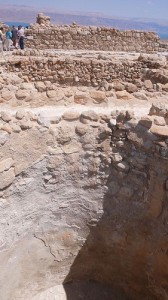 Haim Watzman
Haim Watzman
So intensely was I listening to my iPod that I bumped straight into Haim Abutbul as I galloped into the stairwell leading up to my apartment. Haim is my downstairs neighbor, and other than sharing a name, we don’t have much in common. He’s Moroccan, retired, round, short, and has a moustache. I’m the opposite.
After I apologized and he mumbled an acceptance, he strode right past me, smeared silicone on the door jamb, and affixed a clear plastic mezuzah. Stepping back to admire his handiwork, he bumped into me again. This time he apologized and I mumbled.
“I bought a new one,” he explained. “New housing, new and expert parchment. The works.”
I nodded, in rush to get upstairs to a long-delayed lunch. “Tizkeh lemitzvot,” may you perform many other good deeds, I said. I put a foot on the bottom step but Haim would not let me go.
“Haim, you must have noticed that a lot of people in our entrance have been getting sick lately,” Haim said ominously.
“I hadn’t,” I apologized. “I feel fine myself.”
Rosh Hashanah
Who By Fire
Briefly, I’ve mentioned that I had a fire in my apartment on Rosh Hashanah. My new column in Moment Magazine tries to make sense of that timing: I’m a rationalist. My grandmother’s mumbled imprecations against the evil eye seemed silly by the time I was seven. I don’t believe in omens. When I read ancient … Read more
Shana Tova!
South Jerusalem wishes all our readers–those who love us, those who hate us, those who agree with us, those who disagree–a happy Jewish new year. Here in South Jerusalem we’ll be celebrating the two-day holiday with our families and engaging in examining our own faults and forgiving those of others. And we’ll be contemplating how … Read more
The Cistern And The King–An Elul Story
 A cool wind blows through the vineyard in Yavneh late in the month of Elul. The sun, obscured by large but unthreatening gray-blue cloud, has passed the sky’s pinnacle. Rabban Yohanan Ben-Zakkai’s students, who until just a few minutes previously had been engaged in a heated debate over whether the shofar could be blown when Rosh Hashanah falls on Shabbat. This was formerly allowed only in the Holy Temple, which was destroyed some years before. Could a rule applying just to the sacred precinct now be expanded to include all of Jerusalem, or perhaps Yavneh as well, or even the entire Land of Israel?
A cool wind blows through the vineyard in Yavneh late in the month of Elul. The sun, obscured by large but unthreatening gray-blue cloud, has passed the sky’s pinnacle. Rabban Yohanan Ben-Zakkai’s students, who until just a few minutes previously had been engaged in a heated debate over whether the shofar could be blown when Rosh Hashanah falls on Shabbat. This was formerly allowed only in the Holy Temple, which was destroyed some years before. Could a rule applying just to the sacred precinct now be expanded to include all of Jerusalem, or perhaps Yavneh as well, or even the entire Land of Israel?
“We seem,” says Rabban Yohanan—the Nasi, head of the Sanhedrin, reconstituted here on the southwestern coastal plane of the Holy Land after the Temple’s destruction—“to have lost our train of thought.”
Rabbi Yosi points to the sky. “Since the destruction of the Holy Temple, a cloud often passes between us and divine inspiration.”
“Perhaps,” says Rabban Yohanan, “I should tell a story.





